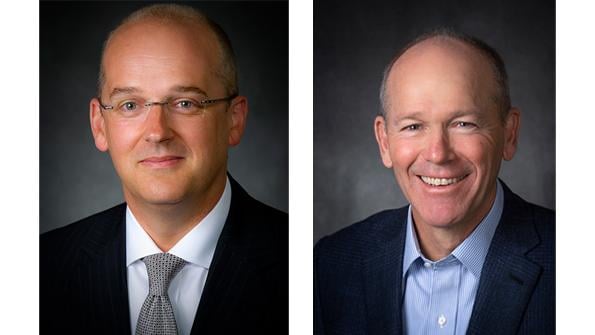
It is official—Boeing has entered the Dave Calhoun era, and the U.S. aerospace and defense giant may never be the same. Then again, it might look a lot more like it did in the past.
“Boeing is now and will forever be an engineering company,” Calhoun declared April 20 at the annual general shareholders meeting. “We design, we build and sustain the world’s most advanced technology operating from the depths of the ocean to the far reaches of space.”
Any other day and that statement would be passed off as corporate rhetoric. But on the morning it was uttered, Boeing CEO and President Calhoun cemented his takeover of Boeing, with the board of directors raising the corporate retirement age cap for the CEO to 70 from 65. (Calhoun turned 64 this month.) Also of significance, Boeing announced that well-known Chief Financial Officer (CFO) Greg Smith—a 2011 appointee of then-Chairman and CEO Jim McNerney—will retire July 9. A search for a successor has started.
The moves collectively guarantee that the corner office overlooking the Chicago River is Calhoun’s to lose. Indeed, the directors he has helped line up were approved by a majority of shareholders at the annual meeting, despite a call by one major institutional investment advisor to vote against reappointment of Ed Giambastiani and Chairman Larry Kellner.
Some observers complain that stakeholders did not have time to digest the retirement-cap announcement, which came out hours before the meeting was convened and the board ratified it. But going into the shareholder meeting, industry insiders did not foresee trouble for any directors. Not surprisingly, the coming CFO change created the most proverbial shockwaves.
Smith, 54, is well regarded on Wall Street. While history will debate the degree to which Boeing lost its way on its march to becoming a “global industrial champion” under McNerney and his successor Dennis Muilenburg, Smith without a doubt oversaw the greatest spate of shareholder returns in Boeing’s century-plus existence.
Smith joined Boeing in 2008 and was long identified for leadership potential. After becoming CFO, his roles expanded with operational duties as executive vice president of enterprise operations, finance and sustainability. He even served as interim CEO between Muilenburg and Calhoun. “In our view, Greg Smith was well respected by investors and internally for his attention to detail and strong leadership in leading the financial enterprise,” said Jefferies analysts Sheila Kahyaoglu and Greg Konrad.
“Given how much praise CEO Calhoun had heaped on CFO Smith over the last year, the news that he is retiring may appear odd,” said analysts Rob Stallard and Karl Oehlschlaeger of Vertical Research Partners. “But after a decade running the Boeing finance department, Smith has had a good run, and the last two years have been particularly challenging. For Calhoun, Smith’s decision to step down presents an opportunity and a risk. While a Boeing outsider as CFO could bring a new perspective, this is a company that has tended to promote internally in the past.”
Was he pushed or did he jump? Financial analysts largely believe Smith is leaving on his own accord. Calhoun, who was a board member, became CEO in January 2020, but there was always a cloud of questions of how long he would stay, what he would try to do and who would replace him. Now, he could stay up to six more years, meaning Smith would be around 60 when he next gets a shot at the top. After being so close, waiting so long is unappealing to anyone in the C-suite crowd.
“He is well regarded and considered a strong leader,” Cowen analysts Cai von Rumohr, Scott McCrery and Dan Flick said of Smith. “Hence, he likely is hopeful of becoming a CEO.”
For sure, Calhoun owns Boeing’s fate, and there are many challenges. Aerospace intelligentsia continue to grumble about its halting efforts to develop a midmarket competitor to the Airbus A321XLR, as well as its supply chain management and U.S. Air Force KC-46A military tanker problems, and seeming capitulation of space leadership to SpaceX. Then there is disappointment among shareholders big and small, regulators, lawmakers and, most importantly, relatives of the 346 MAX accident victims.
To their credit, Calhoun and others now talk openly about their culture-change efforts. “The board is committed to continuing this refresh process, [a] culture of transparency and accountability, including through regular dialogue with our shareholders,” Kellner said. If they can do it, most stakeholders probably would be satisfied if they could just make Boeing great again.






Comments
As a supplier to Boeing, I witnessed the shift to profit driven motives over Engineering with the 'Partnering For Success' strategy Boeing began to demand of the supply base. It forced Boeing and suppliers to make decisions that were short term focused.
The 737 Max took the same approach and left all stakeholders with a significant challenge to their business. Profit and market share drove that decision rather than better engineering designs.
Mr. Calhoun has a big challenge on his hands. I truly hope he succeeds.